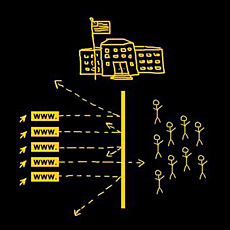
Today the ACLU will be appearing in court to ask a federal judge to stop Camdenton R-III from censoring LGBT-supportive content on school library computers. We represent a Camdenton High School student and four organizations who seek to provide supportive resources for LGBT youth and allies but are blocked by the district's library computers: PFLAG, DignityUSA, Campus Pride and Matthew Shepard Foundation.
The First Amendment prohibits public schools from censoring school library books based on those books' viewpoints or ideas. School officials have a lot of discretion in deciding what to teach students in the classroom, but the school library plays a special role as a marketplace of ideas. For example, courts have held that schools cannot remove a novel involving a romance between a same-sex couple because the school disapproves of homosexuality, and schools cannot remove Harry Potter books from the library because they believe the books promote witchcraft.
Those same rules apply when it comes to the Internet. Just as a school can't selectively take LGBT-supportive books off the library shelves or clip LGBT-related articles out of the newspaper, a school also can't decide that it is going to allow students access to websites that condemn homosexuality as a sin, but not let students read websites supporting LGBT youth and their legal rights.
That is exactly what Camdenton R-III is doing. Instead of buying Internet filtering software from a reputable company, the district has downloaded a filtering database from an obscure website called . The URL Blacklist database has a category called "sexuality," which collects LGBT-supportive websites and lumps them together with sexually explicit websites about swinger clubs and sexual fetishes. Students at Camdenton R-III can't access the LGBT-supportive content because it has been sequestered behind the "sexuality" filter. In contrast, anti-LGBT websites are not placed in the "sexuality" filter and are fully accessible for students.
This case has nothing to do with pornography or sexually explicit materials. None of the websites at issue in our case are sexually explicit in any way. Thousands of schools across the country have purchased viewpoint-neutral software from reputable companies that enable them to block pornography without discriminating against non-sexual LGBT-supportive websites. In fact, the viewpoint-neutral filters from other companies do a better job at blocking pornography than Camdenton's current system. If the district switches to a viewpoint-neutral system, it would be able to provide students with equal access to LGBT-support websites and also block more pornography. At the same time, by refusing to switch filtering systems Camdenton R-III is exposing students to more pornography while also violating the First Amendment.
For LGBT students, this isn't just an abstract issue. At a time when we are seeing an alarmingly high rate of suicide among LGBT youth, Camdenton is blocking students from accessing anti-bullying resources, suicide hotlines, and even religious organizations that help LGBT youth and families. By blocking these sites Camdenton is not only stopping students from reading this information, it is also sending a message to the students and the entire school community that being LGBT is something dirty or shameful.
Learn more about web filtering: Sign up for breaking news alerts, , and .


